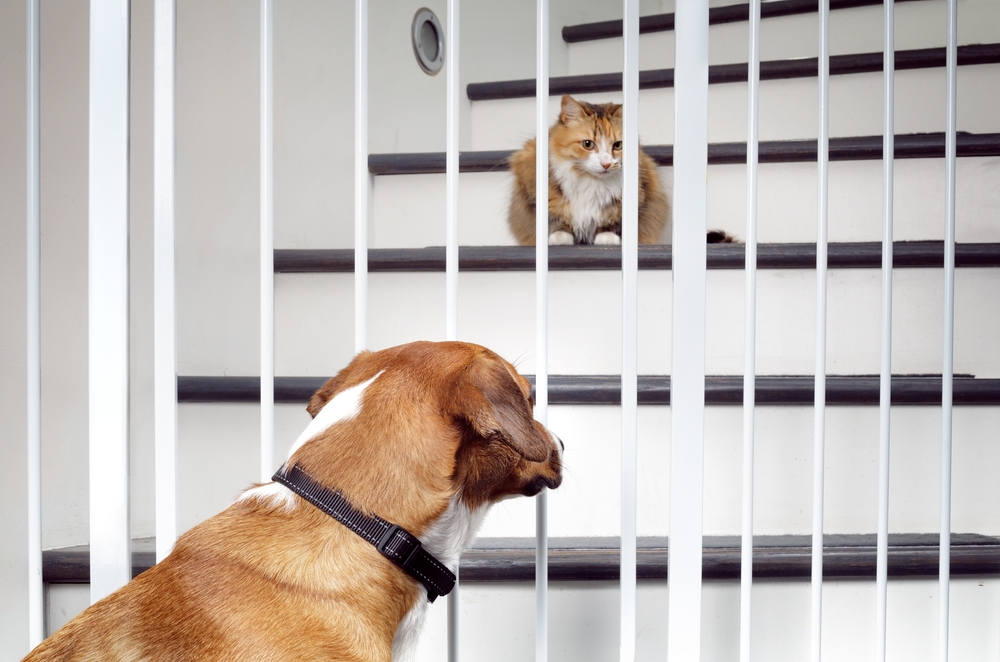As a pet owner, you want to create a safe and welcoming environment for your beloved companion. However, it’s important to recognize that some common items found in your home could be harmful to your pet. At Peak City Veterinary Hospital, we want to help you keep your pet safe by highlighting some everyday things that might be toxic or hazardous to them.
Food dangers for your pet
It might be tempting to share your favorite snacks with your pet, but some human foods are toxic to dogs and cats:
- Grapes and raisins — These fruits can cause acute kidney failure in dogs and cats, leading to vomiting, lethargy, and, potentially, death. Even a small amount can be dangerous.
- Chocolate — Chocolate contains theobromine, which dogs and cats cannot metabolize through their systems effectively. The darker the chocolate, the more dangerous it is, with baking chocolate posing the greatest risk. Signs of chocolate toxicity include vomiting, diarrhea, restlessness, increased thirst, and, potentially, seizures.
- Xylitol — Often found in sugar-free gum, peanut butter, and baked goods, xylitol can cause dangerously low blood sugar levels (hypoglycemia) and even liver failure in dogs. Signs of hypoglycemia include weakness, tremors, and seizures.
- Onions, garlic, and chives — These flavorful ingredients in all forms (powdered, raw, cooked) can damage red blood cells and lead to anemia in cats and dogs.
- Avocados — While avocados are delicious for us, the persin found in them (especially the pit, skin, and leaves) can cause vomiting and diarrhea in dogs and cats.
- Macadamia nuts — Even a small amount of these nuts can cause weakness, tremors, vomiting, and increased body temperature in dogs.
- Fatty or salty foods — While not immediately toxic, foods high in fat and salt can lead to pancreatitis (inflammation of the pancreas) in dogs.
- Raw dough — Because it contains uncooked yeast, raw dough can ferment and expand in your pet’s stomach, causing discomfort, a potentially life-threatening condition called bloat, and possible death as a result of alcohol poisoning.
Medicine cabinet dangers for your pet
Human medications can be especially dangerous for your pet. Ingestion can cause medical conditions ranging from blood disorders to organ failure to neurological problems, many of which can be deadly.
- Over-the-counter medications — Ibuprofen, acetaminophen, cold medicine, and even some herbal remedies can cause serious harm or even death in cats and dogs because their systems metabolize these drugs differently than ours do. Never give your pet human medication without veterinary guidance.
- Human vitamins and supplements — Some supplements, particularly those containing iron, calcium, or vitamin D, can cause health issues for pets if accidentally ingested.
Other household dangers for your pet
Pets get into all sorts of things in the home, so it’s essential to understand that even the most innocuous items can cause them real harm.
- Houseplants — Lilies are especially toxic for cats, causing kidney failure, while other plants like tulips, daffodils, and azaleas can irritate their mouths and stomachs or cause other health concerns. Check the ASPCA’s list of toxic and non-toxic plants for a comprehensive list.
- Rodenticides — These products are meant to be fatal to mice and rats, but they can also be dangerous for pets if ingested. Pets can also be exposed by eating a rodent that has eaten the poison. Signs can be delayed, so seek veterinary care immediately if you suspect ingestion.
- Cleaning products — Many household cleaning supplies contain harsh chemicals that can cause burns, respiratory problems, and even neurological damage if pets ingest them. Choose pet-safe options or ensure you store these chemicals securely.
- Essential oils — While they might smell nice to us, some essential oils can be toxic to cats and dogs, whether applied to the skin or diffused into the air. Research specific oils before using them around pets.
- Antifreeze — The sweet taste of antifreeze can be attractive to pets, but it’s highly toxic. Even a small amount can lead to kidney failure. Store the product securely, and clean up spills immediately.
- Mothballs — Naphthalene in mothballs can be harmful if ingested, causing vomiting, tremors, or seizures.
- Tobacco products — Nicotine in cigarettes, cigars, and even e-cigarettes can be toxic to pets if ingested.
Steps to keep your pet safe

Pet-proofing is just as important as babyproofing when it comes to keeping your loved ones safe. Here are a few tips to help keep your pet safe and sound:
- Pet-proof your home — Store food, medications, cleaning supplies, and other potentially dangerous items securely out of your pet’s reach. Use childproof latches on cabinets if necessary.
- Supervise your pet — Keep a watchful eye on them, especially when they’re exploring new areas or if they have a habit of chewing on objects.
- Know what to do in an emergency — If you suspect your pet has eaten something poisonous, contact your Peak City Veterinary Hospital veterinarian or the ASPCA Animal Poison Control Center hotline (1-888-426-4435) immediately. Time is often critical.
We understand the bond between people and their pets and are dedicated to providing your pet with the best possible care. If you have concerns about potential hazards in your home or think your pet might have been exposed to something toxic, don’t hesitate to contact Peak City Veterinary Hospital for an appointment.









Leave A Comment